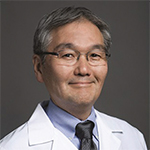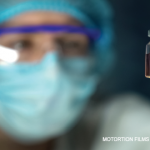
Dr. Yokoyama
emphasis on immunology, says Dr. Atkinson. There was “fortuitous overlap” with the Dermatology Department and skin biologists working on proteases, and with the pathology and the immunology programs. (Note: The latter two programs are now combined as the Department of Pathology and Immunology.) By the mid-1970s, when Dr. Atkinson came to St. Louis after his residency at Massachusetts General Hospital and post-doctoral work on the complement system at the NIH, “It became clear that immunology was going to dominate in rheumatology,” he says. Dr. Atkinson was given an HHMI investigator position and appointed director of the division in 1976.
Challenging Scientific Dogma
“There are many different strategies to advance knowledge in rheumatology and the rheumatic diseases,” notes Wayne M. Yokoyama, MD, professor of medicine, and of pathology and immunology, Sam J. Levin and Andrey Loew Levin Chair for Research on Arthritis, and investigator, Howard Hughes Medical Institute. He was recruited to Wash U’s School of Medicine in 1995 to head the division in the Department of Medicine. Dr. Atkinson was chair of the Department of Medicine at that time. Dr. Yokoyama saw the move as “a great opportunity to join an institution that already had a strong basic immunology research community.”
Dr. Yokoyama leads one of eight substantial research laboratories in the division and directs the Rheumatic Diseases Core Center, which is supported by the National Institute of Arthritis and Musculoskeletal and Skin Diseases (NIAMS). He is also a member of the National Academy of Sciences and the National Academy of Medicine (formerly the Institute of Medicine). Like Dr. Atkinson, Dr. Yokoyama is a recipient of the Lee C. Howley Prize for Research in Arthritis. He is prominently noted for his work on Ly49 receptors on natural killer (NK) cells, and the discovery of their intrinsic involvement in recognition of MHC Class I molecules, which “turn off” the NK cell, one of the first examples of inhibitory receptors on immune cells. That work was first begun relative to advancing the immune system understanding in cancer and led to breakthroughs in the immunologic bases of rheumatic and other autoimmune conditions.
“You don’t know where the advance will come from, or whether your work will have a bigger impact on a different disease, so having a broad perspective is useful,”
Dr. Yokoyama says. He also says his own post-doctoral and faculty mentors, such as Robert Ashman, MD, at the University of Iowa, Ethan Shevach, MD, at the NIH and Ira M. Goldstein, MD, at UCSF (who was also the first president of the newly renamed ACR), taught him “to do outstanding work and follow the data.”

